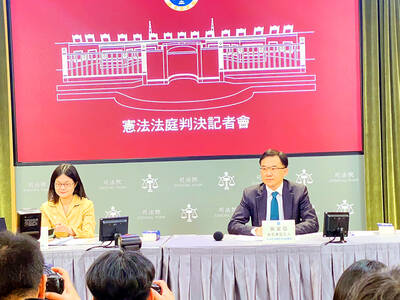The essence of cross-strait economic integration is to advance the undertaking of peaceful unification with China, a Chinese expert on Taiwan affairs said at a cross-strait forum yesterday.
Li Fei (李非), deputy director of the Taiwan Research Center at Xiamen University, said China’s policy of pushing cross-strait economic exchanges has three benefits.
First, it will strengthen China’s economic power and propel economic development in the region. Second, it will stabilize cross-strait relations and spur the two sides’ policy interactions. Finally, it will push forward peaceful unification through economic integration.
Li made the remarks during the first annual forum on the global development of businesses across the Taiwan Strait and the eighth annual cross-strait scientific and economic forum in Taipei City yesterday morning.
Li caused a stir in February when the Washington Post published an interview in which he suggested that Taipei’s plan to sign an economic cooperation framework agreement (ECFA) with Beijing “represents an important step toward the possibility of unification of the longtime adversaries.”
He told the Post that the agreement would be a significant milestone in gradually warming relations between the two sides.
“It’s a start toward full cross-strait economic integration and a necessary condition for marching forward toward final unification,” Li said.
The Presidential Office later dismissed concerns that signing the economic pact would be one more step toward unification, insisting that the government would make the nation’s interests the priority when dealing with China.
While the administration has tried to play down the political implications of an ECFA, Li yesterday said that to intensify trade and economic cooperation with Taiwan would facilitate Taiwan’s economic reliance on China and increase the might of China-based Taiwanese businesses.
Analyzing Beijing’s strategy for promoting cross-strait economic cooperation with Taiwan, Li said the top priority was to develop trade relations and let market power gradually become the driving force behind economic exchanges.
As bilateral talks were resumed under the so-called “1992 consensus,” Li said future political negotiations would be based on the “one China” principle under the pretext of negotiations on issues concerning the economy or people’s livelihoods, as well as technical or administrative issues.
The development of political relations between the two sides would consist of several steps, he said. They were: engaging in political dialogue, ending cross-strait enmity, signing a peace treaty, conducting political negotiations on such issues as Taiwan’s political status and finally, undertaking negotiations on unification.
The second priority was to dole out small favors to “Taiwan compatriots,” he said, adding that “you don’t get something for nothing” and that “a man with big wisdom makes big compromises, and a man with small wisdom makes small concessions.”
As the normalization of economic exchanges is attained, Li said, efforts must be made to institutionalize economic ties, including establishing a “cross-strait economic cooperation mechanism” and signing a “cross-strait economic cooperation agreement.”

TRAGEDY STRIKES TAIPEI: The suspect died after falling off a building after he threw smoke grenades into Taipei Main Station and went on a killing spree in Zhongshan A 27-year-old suspect allegedly threw smoke grenades in Taipei Main Station and then proceeded to Zhongshan MRT Station in a random killing spree that resulted in the death of the suspect and two other civilians, and seven injured, including one in critical condition, as of press time last night. The suspect, identified as a man surnamed Chang Wen (張文), allegedly began the attack at Taipei Main Station, the Taipei Fire Department said, adding that it received a report at 5:24pm that smoke grenades had been thrown in the station. One man in his 50s was rushed to hospital after a cardiac arrest

PUBLIC SAFETY: The premier said that security would be tightened in transport hubs, while President Lai commended the public for their bravery The government is to deploy more police, including rapid response units, in crowded public areas to ensure a swift response to any threats, President William Lai (賴清德) said yesterday after a knife attack killed three people and injured 11 in Taipei the previous day. Lai made the remarks following a briefing by the National Police Agency on the progress of the investigation, saying that the attack underscored the importance of cooperation in public security between the central and local governments. The attack unfolded in the early evening on Friday around Taipei Main Station’s M7 exit and later near the Taipei MRT’s Zhongshan

ON ALERT: Taiwan’s partners would issue warnings if China attempted to use Interpol to target Taiwanese, and the global body has mechanisms to prevent it, an official said China has stationed two to four people specializing in Taiwan affairs at its embassies in several democratic countries to monitor and harass Taiwanese, actions that the host nations would not tolerate, National Security Bureau (NSB) Director-General Tsai Ming-yen (蔡明彥) said yesterday. Tsai made the comments at a meeting of the legislature’s Foreign Affairs and National Defense Committee, which asked him and Minister of National Defense Wellington Koo (顧立雄) to report on potential conflicts in the Taiwan Strait and military preparedness. Democratic Progressive Party (DPP) Legislator Michelle Lin (林楚茵) expressed concern that Beijing has posted personnel from China’s Taiwan Affairs Office to its

‘ILLEGAL RULING’: The KMT and the TPP slammed the Constitutional Court judgement, saying it contravened the law and was trying to clear the way for a ‘green dictatorship’ The Constitutional Court yesterday ruled that amendments to the Constitutional Court Procedure Act (憲法訴訟法) passed by the Legislative Yuan last year are unconstitutional, as they contravene due legislative process and separation of powers. The Legislative Yuan on Dec. 20 last year passed amendments stipulating that no fewer than 10 grand justices must take part in deliberations of the Constitutional Court, and at least nine grand justices must agree to declare a law unconstitutional. The Executive Yuan on Jan. 2 requested that lawmakers reconsider the bill, but the Legislative Yuan, under a combined majority of Chinese Nationalist Party (KMT) and Taiwan People’s Party